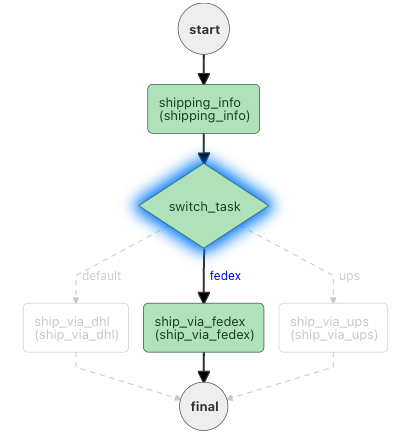Switch
The Switch task (SWITCH) is used for conditional branching logic. It represents if...then...else or switch...case statements in programming, which is useful for executing one of many task sequences based on pre-defined conditions.
At runtime, the Switch task evaluates an expression and matches the expression's output with the name of the switch cases defined in the task configuration. The workflow then executes the tasks in the matching branch. If there is matching branch found, the default branch will be executed.
The Switch task supports two types of evaluators:
value-param—A reference to the task input parameter key.javascript—A complex JavaScript expression.
Task parameters
Use these parameters in top level of the Switch task configuration.
| Parameter | Type | Description | Required / Optional |
|---|---|---|---|
| evaluatorType | String (enum) | The type of the evaluator used. Supported types:
|
Required. |
| expression | String | The expression evaluated by the Switch task. The expression format depends on the evaluator type:
|
Required. |
| decisionCases | Map[String, List[task]] | A map of the possible switch cases and their tasks. The keys are the possible values that can result from the evaluation of expression, while the values are the lists of task configurations that will be executed. |
Required. |
| defaultCase | List[Task] | The default switch case, containing the list of tasks to be executed if no matching switch case is found in decisionCases. |
Required. |
| inputParameters | Map[String, Any] | The input parameters for the task. Note: If evaluatorType is value-param, inputParameters must be populated with the key specified in expression. |
Optional. |
JSON configuration
Here is the task configuration for a Switch task.
Using value-param
{
"name": "switch",
"taskReferenceName": "switch_ref",
"inputParameters": {
"switchCaseValue": "${workflow.input}"
},
"type": "SWITCH",
"decisionCases": {
"caseName1": [
{
// task configuration
}
],
"caseName2": [
{
// task configuration
},
{
// task configuration
}
]
},
"defaultCase": [
{// task configuration}
],
"evaluatorType": "value-param",
"expression": "switchCaseValue"
}
Using javascript
{
"name": "switch",
"taskReferenceName": "switch_ref",
"inputParameters": {
"switchCaseValue": "${workflow.input.num}"
},
"type": "SWITCH",
"decisionCases": {
"apples": [
{
// task configuration
}
],
"tomatoes": [
{
// task configuration
}
],
"oranges": [
{
// task configuration
}
]
},
"defaultCase": [],
"evaluatorType": "graaljs",
"expression": "(function () {\n switch ($.switchCaseValue) {\n case \"1\":\n return \"apple\";\n case \"2\":\n return \"tomatoes\";\n case \"3\":\n return \"oranges\"\n }\n }())"
}
Output
The Switch task will return the following parameters.
| Name | Type | Description |
|---|---|---|
| evaluationResult | List[String] | A list of values representing the list of cases that matched. |
| selectedCase | String | The evaluation result of the Switch task. |
Examples
Here are some examples for using the Switch task.
Using value-param
In this example workflow, a package with be shipped by a specific shipping provider, based on the given workflow input. Here is the Switch task configuration, using the value-param evaluatorType:
{
"name": "switch",
"taskReferenceName": "switch_ref",
"inputParameters": {
"switchCaseValue": "${workflow.input.service}"
},
"type": "SWITCH",
"evaluatorType": "value-param",
"expression": "switchCaseValue",
"defaultCase": [
{
...
}
],
"decisionCases": {
"fedex": [
{
...
}
],
"ups": [
{
...
}
]
}
}
In the Switch task above, the value of the task input switchCaseValue is used to determine the selected case. The evaluator type is value-param and the expression is a direct reference to the name of the input parameter.
If the value of switchCaseValue is fedex, then the fedex branch containing the ship_via_fedextask will be executed as shown below.

Likewise, if the input is ups, then the ship_via_ups task will be executed. If none of the cases match, then the default path will be executed.
Using javascript
In this example, the switch cases are selected using the javascript evaluatorType:
{
"name": "switch",
"taskReferenceName": "switch_ref",
"inputParameters": {
"shipping": "${workflow.input.service}"
},
"type": "SWITCH",
"evaluatorType": "javascript",
"expression": "$.shipping == 'fedex' ? 'fedex' : 'ups'",
"defaultCase": [
{
...
}
],
"decisionCases": {
"fedex": [
{
...
}
],
"ups": [
{
...
}
]
}
}
Inside the task's JavaScript-based expression, the task's input parameter is referenced using "$.shipping".